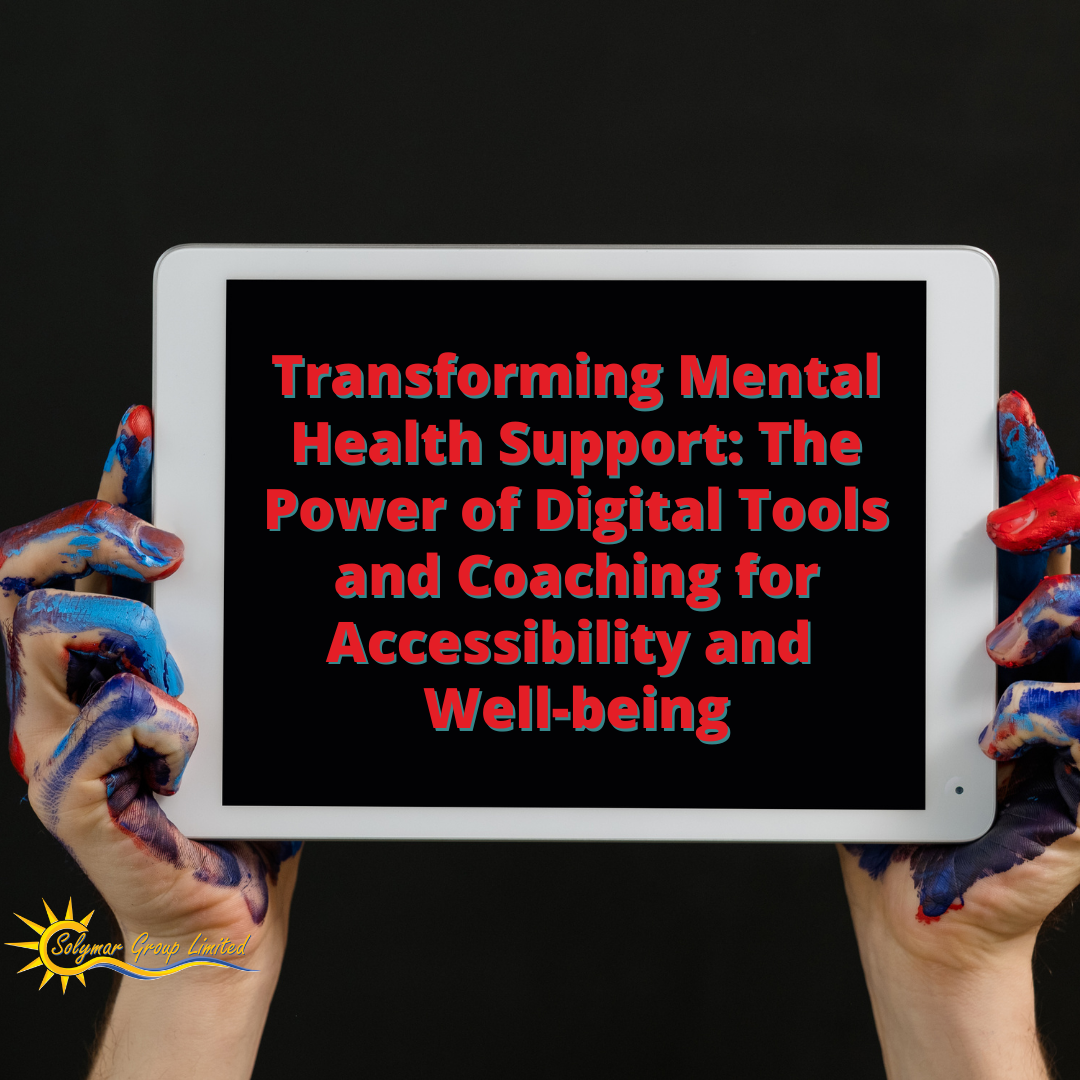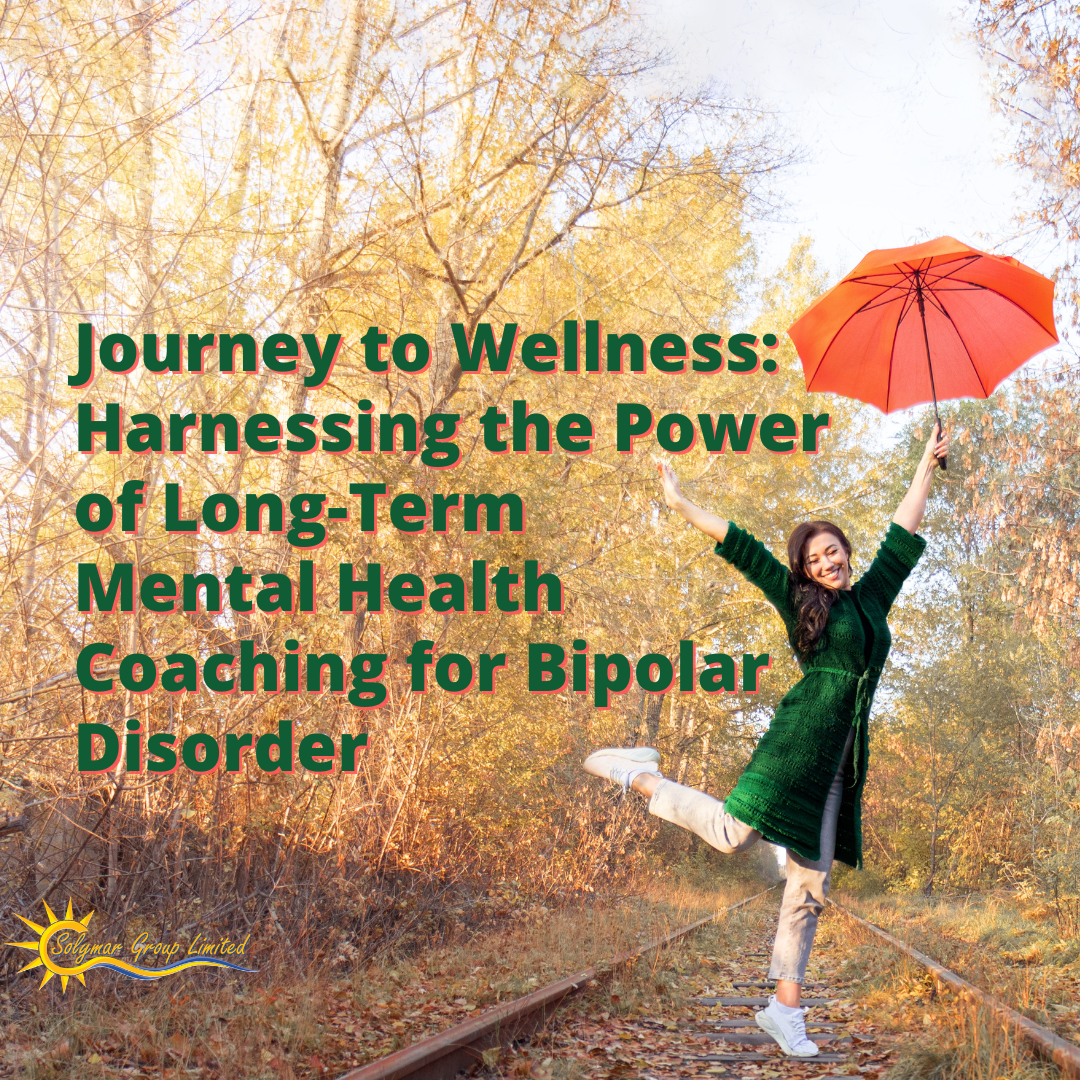 The rise of digital mental health has brought about a profound transformation in the accessibility of support and care for individuals with mental health concerns. With the advent of mental health apps and the practice of mental health coaching, people now have more accessible and convenient avenues to seek guidance and assistance. As a mental health coach, I have witnessed firsthand how these digital tools have positively impacted individuals' lives. In this article, we will explore the research and studies that highlight the benefits of mental health apps and coaching in improving accessibility for individuals with mental health concerns.
The rise of digital mental health has brought about a profound transformation in the accessibility of support and care for individuals with mental health concerns. With the advent of mental health apps and the practice of mental health coaching, people now have more accessible and convenient avenues to seek guidance and assistance. As a mental health coach, I have witnessed firsthand how these digital tools have positively impacted individuals' lives. In this article, we will explore the research and studies that highlight the benefits of mental health apps and coaching in improving accessibility for individuals with mental health concerns.
 When someone we care about is going through a mental health crisis, our support and understanding can make a tremendous difference in their recovery journey. Navigating mental health challenges can be overwhelming and isolating, but with the right approach and the guidance of a mental health coach, we can provide a lifeline of support. In this blog, we will explore valuable tips, strategies, and empathetic approaches that can help you offer comfort, understanding, and guidance to someone experiencing a mental health crisis, with the assistance of a mental health coach.
When someone we care about is going through a mental health crisis, our support and understanding can make a tremendous difference in their recovery journey. Navigating mental health challenges can be overwhelming and isolating, but with the right approach and the guidance of a mental health coach, we can provide a lifeline of support. In this blog, we will explore valuable tips, strategies, and empathetic approaches that can help you offer comfort, understanding, and guidance to someone experiencing a mental health crisis, with the assistance of a mental health coach.
-
Educate Yourself
Take the time to educate yourself about mental health and the specific challenges your loved one is facing. Learn about the symptoms, potential triggers, and available strategies for managing mental health. This knowledge will not only help you understand their experiences but also enable you to provide informed support, alongside the guidance of a mental health coach.
-
Practice Empathy and Active Listening
During a mental health crisis, being a compassionate listener is vital. Show genuine empathy by actively listening without judgment or interruption. Allow them to express their thoughts and feelings, creating a safe space where they can share openly. A mental health coach can help guide you on effective communication techniques that promote empathy and active listening.
-
Be Available and Reliable
Consistency and reliability are crucial when supporting someone through a mental health crisis. Let them know that you are there for them, both physically and emotionally. Offer your support without imposing solutions or expectations. With the guidance of a mental health coach, you can learn effective ways to be available and reliable, providing the necessary support while respecting boundaries.
-
Encourage Professional Help, including Mental Health Coaching
While your support is valuable, it's essential to encourage the person in crisis to seek professional help, including the assistance of a mental health coach. Suggest they work with a mental health coach who can provide personalized strategies, guidance, and support tailored to their specific needs. Offer assistance in finding a reputable mental health coach or accompany them to sessions if appropriate.
-
Create a Supportive Environment
Promote a supportive environment that fosters well-being. Encourage healthy coping mechanisms, such as engaging in physical activity, practicing mindfulness, or pursuing hobbies. With the help of a mental health coach, you can learn how to create a supportive environment that complements their coaching process, ensuring they have the necessary tools for self-care and recovery.
-
Respect Boundaries
Respecting boundaries is crucial when supporting someone through a mental health crisis. Recognize that they might need personal space or time alone to process their thoughts and emotions. A mental health coach can provide guidance on establishing healthy boundaries and navigating complex situations, ensuring that you support them in a way that is respectful and empowering.
-
Use Empowering Language
Using language that empowers and uplifts can greatly impact someone's mental health journey. Be mindful of the words you use, avoiding negative labels or belittling their experiences. Instead, use language that is positive, encouraging, and supportive. A mental health coach can help you develop effective communication skills.
Hashtags: #MentalHealthSupport #SupportingOthers #EmotionalWellbeing #MentalHealthCoach #SupportDuringCrisis #MentalHealthTips #MentalHealthStrategies #EmpatheticSupport #MentalHealthRecovery
 Living with Bipolar Disorder can be challenging, as individuals often experience drastic shifts in mood, energy, and behavior. Managing the symptoms of this complex mental health condition requires a comprehensive approach that goes beyond medication and therapy. Long-term mental health coaching plays a vital role in supporting individuals with Bipolar Disorder, empowering them to navigate their journey towards stability, self-care, and overall well-being.
Living with Bipolar Disorder can be challenging, as individuals often experience drastic shifts in mood, energy, and behavior. Managing the symptoms of this complex mental health condition requires a comprehensive approach that goes beyond medication and therapy. Long-term mental health coaching plays a vital role in supporting individuals with Bipolar Disorder, empowering them to navigate their journey towards stability, self-care, and overall well-being.
Bipolar Disorder is characterized by extreme mood swings, ranging from manic episodes of elevated energy and euphoria to depressive episodes of sadness and low motivation. The fluctuating nature of this disorder can make it difficult for individuals to maintain a sense of balance and stability in their lives. That's where long-term mental health coaching becomes invaluable.
One of the primary benefits of long-term mental health coaching for individuals with Bipolar Disorder is the development of effective coping strategies. A mental health coach works closely with the client to identify triggers, early warning signs, and patterns associated with mood episodes. By understanding these patterns, individuals can proactively implement coping mechanisms to mitigate the impact of potential mood swings. These strategies may include maintaining a regular sleep schedule, practicing stress reduction techniques, engaging in physical exercise, and adopting healthy lifestyle habits.
Emotional regulation is another crucial aspect of long-term mental health coaching for Bipolar Disorder. A mental health coach assists individuals in recognizing and managing their emotions effectively. They provide guidance on identifying the signs of emotional dysregulation and teach techniques to regulate and stabilize emotions. This can help prevent impulsive behaviors during manic episodes and reduce feelings of hopelessness and despair during depressive episodes.
Moreover, long-term mental health coaching supports individuals in mastering symptom management. Through ongoing coaching sessions, clients learn to identify early signs of relapse, such as changes in sleep patterns, irritability, or decreased motivation. With the guidance of a mental health coach, individuals can develop personalized action plans to address these warning signs and prevent the escalation of symptoms. This proactive approach empowers clients to take control of their mental health and make informed decisions to avoid potential crises.
Self-care is a vital component of long-term mental health coaching for Bipolar Disorder. Many individuals with Bipolar Disorder struggle with self-esteem, self-worth, and self-compassion. A mental health coach helps clients develop self-care routines and encourages them to prioritize their well-being. This may include activities like mindfulness exercises, engaging in hobbies, setting boundaries, practicing relaxation techniques, and fostering social support networks. By nurturing a strong foundation of self-care, individuals with Bipolar Disorder can enhance their resilience and overall quality of life.
Long-term mental health coaching also addresses the holistic well-being of individuals with Bipolar Disorder. It extends beyond symptom management and explores various dimensions of wellness, such as physical health, relationships, career, and spirituality. A mental health coach collaborates with clients to set achievable goals in these areas and provides guidance and accountability throughout their journey. This comprehensive approach supports individuals in achieving a balanced and fulfilling life, even in the presence of Bipolar Disorder.
One of the key advantages of long-term mental health coaching is the establishment of a trusted and consistent relationship between the coach and the client. This bond fosters a safe and non-judgmental space for individuals to express their thoughts, emotions, and concerns. Unlike other mental health professionals who may have limited time for sessions, mental health coaches often offer more frequent check-ins and ongoing support. This regular interaction allows for a deeper understanding of the individual's experiences and helps the coach tailor strategies and interventions to their specific needs.
Furthermore, long-term mental health coaching can assist individuals in building resilience and developing a proactive mindset. It equips them with the tools and skills necessary to navigate the ups and downs of Bipolar Disorder effectively. By fostering self-awareness, clients can recognize their strengths, limitations, and personal triggers. With this knowledge, they can make informed choices and take preventive measures to maintain stability in their lives. This proactive approach empowers individuals to take control of their mental health journey and reduces the likelihood of experiencing severe mood episodes.
In addition to individual coaching sessions, group coaching can also be beneficial for individuals with Bipolar Disorder. Group coaching provides a supportive community of individuals who understand and empathize with the challenges of living with the condition. It offers a platform for sharing experiences, exchanging coping strategies, and receiving encouragement. Group coaching can foster a sense of belonging, reduce feelings of isolation, and provide a network of support that extends beyond the coaching sessions.
Another aspect of long-term mental health coaching is the focus on personal growth and goal setting. A mental health coach collaborates with clients to identify their aspirations, values, and areas of improvement. Together, they create realistic and achievable goals that align with the individual's values and strengths. This process not only enhances motivation and self-confidence but also provides a sense of purpose and direction. By working towards meaningful goals, individuals with Bipolar Disorder can experience a sense of accomplishment, contributing to their overall well-being and life satisfaction.
It's important to note that long-term mental health coaching is not a substitute for medical treatment or therapy. Rather, it complements these interventions by providing ongoing support, guidance, and accountability. Mental health coaches work collaboratively with other healthcare professionals to ensure holistic care for individuals with Bipolar Disorder.
In conclusion, the significance of long-term mental health coaching for individuals with Bipolar Disorder cannot be overstated. It offers a comprehensive and personalized approach to managing the challenges of this condition. Through effective coping strategies, emotional regulation techniques, symptom management, and self-care practices, mental health coaching empowers individuals to lead fulfilling lives while effectively managing their Bipolar Disorder. By investing in long-term mental health coaching, individuals can cultivate resilience, enhance their well-being, and embrace a positive and balanced future despite the complexities of their condition.
Hashtags: #BipolarDisorderSupport #MentalHealthCoaching #LongTermMentalHealth #WellbeingJourney
 Living with Borderline Personality Disorder (BPD) can be an immense challenge, but with the aid of mental health coaches and the incorporation of dogs into therapy sessions, individuals with BPD can find solace and support on their path to recovery. In this article, we will explore three powerful ways mental health coaches are including dogs to help clients with BPD improve their emotional well-being and facilitate healing.
Living with Borderline Personality Disorder (BPD) can be an immense challenge, but with the aid of mental health coaches and the incorporation of dogs into therapy sessions, individuals with BPD can find solace and support on their path to recovery. In this article, we will explore three powerful ways mental health coaches are including dogs to help clients with BPD improve their emotional well-being and facilitate healing.
-
Canine-Assisted Therapy for Emotional Regulation
Emotional dysregulation is a core feature of BPD, making it crucial to develop effective strategies for managing intense emotions. Canine-assisted therapy has proven to be an invaluable tool in this regard. Dogs have an innate ability to sense and respond to human emotions, providing immediate comfort and grounding during times of distress.
Mental health coaches incorporate dogs into therapy sessions by encouraging clients with BPD to interact with the animals in a supportive and structured environment. Engaging with dogs can help individuals regulate their emotions through tactile stimulation and the release of oxytocin, a hormone known to promote feelings of calm and well-being. Simply petting, cuddling, or talking to a dog can have a soothing effect, helping to reduce anxiety, anger, and other intense emotions commonly experienced by those with BPD.
-
Building Trust and Enhancing Therapeutic Alliance
Establishing a strong therapeutic alliance is essential for effective treatment of BPD. Dogs play a remarkable role in fostering trust and enhancing the therapeutic relationship between mental health coaches and their clients. As non-judgmental and accepting beings, dogs create a safe and supportive environment where individuals with BPD can feel understood and accepted without fear of rejection or criticism.
Incorporating dogs into therapy sessions helps break down barriers and allows clients to develop trust in their mental health coach. The presence of a dog can help alleviate anxiety and provide a sense of comfort and security, enabling individuals with BPD to open up more easily about their thoughts, feelings, and experiences. This increased trust and rapport facilitate deeper therapeutic work, as clients feel more comfortable exploring and addressing the underlying issues contributing to their BPD symptoms.
-
Mindfulness and Self-Reflection Exercises
Practicing mindfulness and self-reflection is an integral part of BPD treatment, and dogs can serve as valuable aids in these exercises. Mental health coaches often incorporate dogs into mindfulness activities to help clients with BPD cultivate present-moment awareness and develop a deeper connection with themselves.
Clients are encouraged to engage in activities such as walking or sitting quietly with a dog, observing the dog's behavior, and practicing mindfulness techniques while focusing on the present experience. Dogs naturally live in the moment, modeling non-judgmental awareness and acceptance. By observing and mirroring their canine companions, individuals with BPD can learn to let go of judgment, reduce rumination, and cultivate a more compassionate and accepting attitude towards themselves.
Additionally, dogs can help clients with BPD practice self-reflection by serving as mirrors for their emotions and behavior. Dogs are highly attuned to human emotions and can provide feedback through their reactions and body language. Observing
and reflecting on the dog's responses, clients can gain insight into their own emotional states and patterns of behavior. For example, if a client notices that their dog becomes anxious or uneasy when they are feeling overwhelmed, it can serve as a cue to pause and reflect on their own emotional state.
The presence of a dog in therapy sessions also encourages clients to practice self-care and self-compassion. Dogs are masters of living in the present moment and embracing simple pleasures. They remind individuals with BPD to prioritize their own well-being and find joy in small moments of connection and relaxation. Mental health coaches often guide clients in engaging in activities such as grooming or playing with the dog, providing opportunities to practice self-nurturing behaviors and experience the benefits of self-care firsthand.
Incorporating dogs into therapy sessions requires a collaborative effort between mental health coaches and trained therapy dogs. These dogs undergo specialized training to ensure their suitability for therapeutic work and their ability to respond appropriately to a range of client needs. Mental health coaches work closely with dog handlers or animal-assisted therapy professionals to ensure the well-being of both the client and the dog throughout the therapeutic process.
It is important to note that while dogs can be valuable additions to therapy sessions, they do not replace evidence-based treatments for BPD. Dogs are used as complementary tools to enhance the therapeutic experience and support clients on their journey to recovery. It is essential that individuals with BPD receive comprehensive treatment that includes psychotherapy, medication (if necessary), and other evidence-based interventions.
In conclusion, the inclusion of dogs in therapy sessions led by mental health coaches can have profound benefits for individuals with Borderline Personality Disorder. Through canine-assisted therapy, clients gain support in emotional regulation, develop trust and a strong therapeutic alliance, and engage in mindfulness and self-reflection exercises. The presence of these four-legged companions offers a unique and invaluable form of support, helping individuals with BPD navigate their healing journey with increased comfort, insight, and emotional well-being.
If you or someone you know is living with BPD, consider exploring the potential benefits of canine-assisted therapy in collaboration with a qualified mental health coach or therapist. Together, with the guidance of these professionals and the companionship of a loving dog, individuals with BPD can find solace, empowerment, and greater resilience as they work towards a more balanced and fulfilling life.
Hashtags: #MentalHealthCoaches #DogsInTherapy #BPDSupport #EmotionalWellBeing #HealingJourney
 In recent years, the field of mental health coaching has embraced innovative approaches to support individuals on their path to well-being. One particularly effective and increasingly popular method involves incorporating dogs into coaching sessions. These loyal and loving companions have a remarkable ability to positively impact our mental health. In this blog post, we will explore the transformative benefits of mental health coaching with dogs and how their presence can enhance emotional support, reduce stress, increase social interaction, and promote overall well-being.
In recent years, the field of mental health coaching has embraced innovative approaches to support individuals on their path to well-being. One particularly effective and increasingly popular method involves incorporating dogs into coaching sessions. These loyal and loving companions have a remarkable ability to positively impact our mental health. In this blog post, we will explore the transformative benefits of mental health coaching with dogs and how their presence can enhance emotional support, reduce stress, increase social interaction, and promote overall well-being.
Emotional Support
Dogs have an innate ability to provide unconditional love and support, making them ideal partners in mental health coaching. When individuals are struggling with emotional challenges such as anxiety, depression, or trauma, dogs can offer a sense of comfort and stability. The presence of a dog during coaching sessions creates a safe space where individuals can express their thoughts and feelings without fear of judgment. Petting or cuddling a dog can release oxytocin, a hormone associated with bonding and relaxation, helping to alleviate anxiety and promote emotional well-being.
Stress Reduction
Interacting with dogs has been scientifically proven to reduce stress levels. Spending time with these furry companions can lower blood pressure, decrease cortisol (the stress hormone) levels, and increase the production of endorphins (feel-good hormones). Dogs have a calming effect on humans, and their playful and non-judgmental nature can distract individuals from their worries and redirect their focus on the present moment. Incorporating dogs into mental health coaching sessions can provide individuals with a much-needed break from the pressures of everyday life and help them manage stress more effectively.
Increased Social Interaction
For individuals struggling with social anxiety or isolation, dogs can serve as bridges to human connection. Taking a dog for a walk or participating in dog-assisted activities can lead to meaningful interactions with others. Dogs are natural icebreakers and conversation starters, making it easier for individuals to engage with their surroundings and build social connections. Mental health coaching sessions that involve dogs provide a supportive environment where individuals can practice their social skills and gradually develop confidence in interacting with others.
Promotion of Overall Well-being
Dogs play a vital role in promoting overall well-being by encouraging physical activity and a healthy lifestyle. Regular exercise is essential for maintaining good mental health, and dogs are excellent motivators for getting individuals moving. Whether it's going for a walk, playing fetch, or participating in agility training, engaging in physical activities with dogs helps release endorphins, improve mood, and enhance overall fitness. Moreover, the responsibility of caring for a dog can provide individuals with a sense of purpose, structure, and routine, all of which contribute to improved mental well-being.
It is important to note that mental health coaching with dogs is not a substitute for professional therapy or counseling. However, when integrated as a complementary approach, the presence of dogs can greatly enhance the therapeutic process and amplify its benefits. Mental health professionals who incorporate dogs into their coaching sessions can create a nurturing and supportive environment that fosters emotional growth and resilience.
In conclusion, the incorporation of dogs into mental health coaching sessions offers a wide range of benefits for individuals seeking emotional support, stress reduction, increased social interaction, and overall well-being. These loyal companions have an undeniable impact on our mental health and can be powerful allies on our journey to well-being. By providing emotional support, reducing stress, increasing social interaction, and promoting overall well-being, dogs have proven to be exceptional partners in mental health coaching.
Hashtags: #MentalHealthCoaching #DogsAsTherapy #EmotionalSupportAnimals #Wellbeing #MentalHealthAwareness
 Our beliefs act as the lens through which we interpret and make sense of the world around us. They serve as the foundation of our thoughts, emotions, and behaviors, significantly influencing how we perceive and interact with reality. These deeply ingrained core beliefs, often formed during our childhood and shaped by our experiences, have a profound impact on our lives. Understanding the power of our core beliefs and actively examining and reshaping them can lead to personal growth, improved well-being, and a more fulfilling life.
Our beliefs act as the lens through which we interpret and make sense of the world around us. They serve as the foundation of our thoughts, emotions, and behaviors, significantly influencing how we perceive and interact with reality. These deeply ingrained core beliefs, often formed during our childhood and shaped by our experiences, have a profound impact on our lives. Understanding the power of our core beliefs and actively examining and reshaping them can lead to personal growth, improved well-being, and a more fulfilling life.
The Power of Perception
Perception is subjective, and it is heavily influenced by our core beliefs. Imagine two individuals faced with the same situation: one might see it as a challenge and an opportunity for growth, while the other may perceive it as an insurmountable obstacle. These differing interpretations arise from their core beliefs. Our beliefs shape the way we filter and process information, leading us to focus on certain aspects while ignoring others. By becoming aware of our core beliefs, we can gain insight into our perception biases and open ourselves up to new possibilities and perspectives.
The Thought-Emotion Connection
Our core beliefs have a direct impact on our thoughts and emotions. For instance, if we hold a belief that we are not good enough, we may consistently engage in self-critical thoughts, leading to feelings of inadequacy, self-doubt, and anxiety. On the other hand, individuals with empowering beliefs may foster positive and compassionate self-talk, promoting self-confidence and resilience. Our thoughts and emotions form a complex cycle, each influencing the other. By recognizing and challenging our limiting beliefs, we can break free from negative thought patterns, enhance our emotional well-being, and cultivate a more positive mindset.
Behavioral Manifestation
Our core beliefs also guide our behaviors and actions. They serve as the blueprint for how we respond to various situations and challenges. For instance, if we hold a belief that success only comes through hard work, we may consistently push ourselves to work long hours, even at the expense of our well-being. Similarly, if we believe that failure is unacceptable, we might avoid taking risks or pursuing our passions. Our behaviors are driven by our beliefs, shaping our choices, habits, and overall lifestyle. By examining and reshaping our core beliefs, we can align our actions with our true values and goals, leading to more fulfilling and purpose-driven lives.
Unearthing Limiting Beliefs
To harness the power of our core beliefs, we must first identify and examine them. Often, these beliefs operate at a subconscious level, guiding our thoughts and actions without us even realizing it. Engaging in self-reflection and introspection can help us uncover these hidden beliefs. Journaling, therapy, or discussing our thoughts and feelings with trusted individuals can be valuable tools in this process. By exploring our past experiences and the messages we received, we can gain a clearer understanding of our core beliefs and how they influence our lives.
Reshaping Our Core Beliefs
While core beliefs are deeply ingrained, they are not set in stone. With awareness and conscious effort, we can challenge and reshape our beliefs to better serve us. It involves questioning the validity and impact of our existing beliefs and replacing them with more empowering and constructive alternatives. For instance, if we hold a
belief that we are unworthy of love, we can actively challenge that belief by seeking evidence to the contrary and practicing self-compassion. Through affirmations, cognitive-behavioral techniques, and consistent practice, we can gradually rewire our thought patterns and cultivate new, positive beliefs about ourselves and the world.
The Benefits of Transforming Core Beliefs
Transforming our core beliefs can have a profound impact on our overall well-being and quality of life. Here are some key benefits:
-
Increased self-confidence: By replacing limiting beliefs with empowering ones, we can boost our self-confidence and believe in our abilities to overcome challenges and achieve our goals.
-
Improved relationships: Our core beliefs influence the way we perceive and interact with others. By addressing and reshaping negative beliefs, we can foster healthier and more fulfilling relationships, free from insecurities and self-sabotaging behaviors.
-
Enhanced resilience: Positive core beliefs can enhance our resilience in the face of adversity. By adopting a growth mindset and believing in our capacity to learn and adapt, we become more resilient in navigating life's ups and downs.
-
Greater happiness and fulfillment: Our core beliefs shape our overall outlook on life. By cultivating positive beliefs, we can foster a sense of gratitude, optimism, and contentment, leading to greater happiness and fulfillment.
-
Expanded possibilities: Limiting beliefs can restrict our potential and limit our opportunities. By challenging these beliefs, we open ourselves up to new possibilities, growth, and personal development.
Conclusion
Our core beliefs have a profound impact on how we perceive the world, how we think and feel about ourselves, and the actions we take. They shape our reality and influence our overall well-being and life satisfaction. By actively examining and reshaping our core beliefs, we can break free from limiting patterns, enhance our self-perception, and live more authentic and fulfilling lives.
Remember, transforming core beliefs is a gradual and ongoing process. It requires patience, self-compassion, and consistent effort. As we become more aware of our beliefs and their impact, we can consciously choose to replace negative and restrictive beliefs with positive, empowering ones. By doing so, we unlock our true potential, cultivate resilience, and create a life aligned with our values and aspirations.
So, let us embark on the journey of self-discovery, challenge our core beliefs, and embrace the transformative power of reshaping our perception, thoughts, emotions, and behaviors. By embracing this process, we can pave the way for personal growth, happiness, and a more fulfilling existence.
Hashtags: #CoreBeliefs #PerceptionMatters #SelfGrowth #PositiveThinking #MindsetShift #PersonalDevelopment #EmotionalWellBeing
 In today's fast-paced world, taking care of our mental health has become increasingly important. Many people are now realizing the value of seeking support beyond traditional therapy or counseling. One such invaluable resource is a mental health coach. With their expertise in fostering personal growth and enhancing mental wellness, mental health coaches offer numerous benefits for individuals looking to maintain their mental health over the long term. In this blog post, we'll explore the advantages of working with a mental health coach and how their guidance can help you thrive.
In today's fast-paced world, taking care of our mental health has become increasingly important. Many people are now realizing the value of seeking support beyond traditional therapy or counseling. One such invaluable resource is a mental health coach. With their expertise in fostering personal growth and enhancing mental wellness, mental health coaches offer numerous benefits for individuals looking to maintain their mental health over the long term. In this blog post, we'll explore the advantages of working with a mental health coach and how their guidance can help you thrive.
-
Individualized Support: Mental health coaches provide personalized guidance tailored to your unique needs. They take the time to understand your challenges, goals, and aspirations, creating a safe space for you to explore your thoughts and emotions. With their empathetic approach, mental health coaches help you gain insights into yourself, fostering self-awareness and empowering you to make informed decisions about your mental wellbeing.
-
Expertise and Strategies: Mental health coaches possess a wealth of knowledge and practical strategies to help you navigate life's challenges. They can teach you coping mechanisms, stress reduction techniques, and self-care practices that you can incorporate into your daily routine. By arming you with these tools, mental health coaches empower you to develop resilience and maintain your mental wellness over the long term.
-
Goal Setting and Accountability: Working with a mental health coach allows you to establish clear goals for your personal growth and mental wellbeing. They provide guidance in setting realistic and achievable objectives, breaking them down into manageable steps. Moreover, mental health coaches hold you accountable for your progress, providing the necessary motivation and support to help you stay on track. This accountability fosters consistency and ensures you stay committed to your long-term mental health.
-
Holistic Approach: Mental health coaches often take a holistic approach to mental wellbeing, considering various aspects of your life that may impact your mental health. They address not only your emotional well-being but also factors such as physical health, relationships, and work-life balance. By exploring these interconnected areas, mental health coaches help you create a comprehensive plan that supports your overall mental wellness.
-
Enhanced Coping Strategies: Life is filled with stressors and challenges, and a mental health coach can equip you with effective coping strategies. They help you identify unhelpful patterns of thinking and behavior, offering alternative approaches that promote healthier responses. Through this process, mental health coaches enable you to develop resilience and adaptability, enabling you to navigate difficult situations with confidence.
-
Support During Transitions: Transitions in life can be overwhelming, whether it's changing careers, starting a new phase, or dealing with a major life event. Mental health coaches provide invaluable support during these transitions, helping you navigate the associated emotions and uncertainties. They offer guidance, encouragement, and a non-judgmental space to express your concerns and fears. With their assistance, you can effectively manage these transitions and emerge stronger on the other side.
-
Long-Term Mental Wellness: While therapy and counseling often focus on addressing specific issues or concerns, mental health coaching takes a proactive approach to long-term mental wellness. Mental health coaches empower you to develop a sustainable self-care routine
Hashtags: #MentalHealthCoach #LongTermWellbeing #MentalWellness #SelfCare #PersonalGrowth #CopingStrategies






